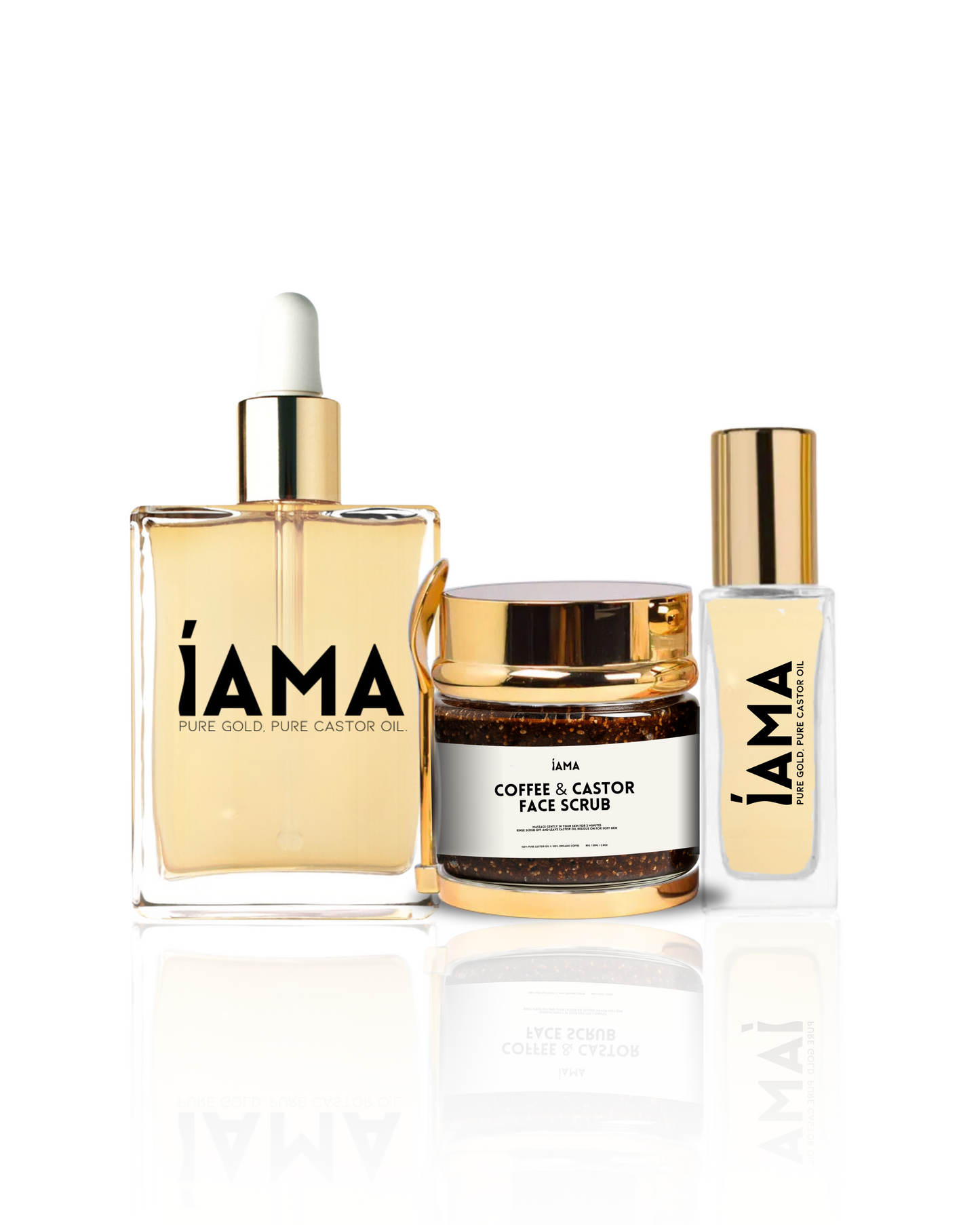I recently visited the "Cult of Beauty" exhibition at the Wellcome Collection in London. My dear friend Simone, who is a big advocate of DIY and natural beauty remedies (and doesn’t even wear makeup!) joined me as she was visiting London. We both came away with a renewed appreciation for the power of holistic, natural approaches to beauty and wellbeing and a determination to continue on our castor oil journey.

Walking through the galleries which were packed with women of all ages and backgrounds (a joy to see), I was struck by the sheer breadth of beauty standards that have actually always existed throughout history. From the elongated necks of ancient Egyptian queens to the porcelain-doll complexion of Hollywood starlets, beauty ideals have almost always existed.
So why does it all feel more toxic now than ever before?
This is more than a perception. Body image dissatisfaction among women has increased significantly over the past several decades as the beauty sector has been booming. A 2016 study found that the percentage of women unhappy with their bodies has increased from 23% in 1972 to 56% in 2018. That’s more than half of women who don’t like their own body! At iAMA we are determined to support women to go on the journey of embracing their body again through the healing power of castor oil.

The second section of the exhibition, dedicated to the "Industry of Beauty," was definitely eye opening. I was shocked to learn that the origins of many beauty treatments that we’ve now normalized, such as electrotherapy for wrinkles, oxygen therapy for skin, and LED light masks - were all developed to address medical problems and not for cosmetic enhancement!
The modern day beauty industry has hijacked and monetized our deepest insecurities as women - the existential shame and feeling that there’s somehow something wrong with us. In reality, we're being sold a huge myth by the beauty industry. The message is that we need to constantly buy more and more products, invest in new technologies, layer 5 different products on our skin just to achieve what is considered a "normal" and "desirable" standard of beauty.

Stats show that the toxicity of the beauty industry, from hair care to skin care to make up and cosmetic procedures is forcing increasingly younger women into a deep level of dissatisfaction with their appearance. According to a study by the Dove Self-Esteem Project, 6 out of 10 girls avoid certain activities like going to the pool or hanging out with friends because they feel bad about the way they look. This constant feeling of "not being good enough" and needing to 'fix' ourselves to feel better can create a cycle of unhealthy comparison and significant mental health challenges. A 2016 study found that the percentage of women unhappy with their bodies has increased from 23% in 1972 to 56% in 2018, demonstrating how women's body image dissatisfaction has grown over time. The pressure to conform to narrow beauty standards perpetuated by the beauty industry can lead women, especially younger ones, to seek radical fixes like invasive cosmetic procedures in a desperate attempt to measure up. This toxic dynamic can have devastating impacts on mental health and self-esteem.
We've been conditioned to believe that our worth and confidence are intrinsically tied to having "glowing glass skin" and hair with more "gloss than our shellac nails." But the reality is, a woman's skin goes through so many natural changes throughout her lifetime - hormonal fluctuations, pregnancy, postpartum, menopause, and more. At every stage, rather than being able to celebrate the incredible resilience and adaptability of our bodies, we're instead programmed to scrutinize every wrinkle, gray hair, and physical change as if it's something foreign or flawed.
This relentless pressure to maintain an unrealistic, youthful appearance can take a massive psychological toll. And the beauty industry is always conveniently ready to swoop in and sell us a "solution" for our fears about aging. Serums, cosmetic procedures, hair dyes - all promised to help us achieve an elusive, eternally youthful ideal.
But what if, instead, we could learn to honor and embrace the story our skin and bodies tell? The beauty in the ebb and flow of our natural cycles? The resilience and strength inherent in the changes we experience over time? It's a radical shift in mindset, but one that could free us from the relentless cycle of self-scrutiny and constant "fixing" that the beauty industry thrives on. Our worth is not determined by our appearance - it lies in the magnificent, ever-evolving miracle of our bodies.

As I wandered through the exhibition, I couldn't help but think about the products that have lined the shelves of my own bathroom cabinet - especially throughout my teens and twenties. Ironically it was when my skin was the healthiest and most elastic and I had so much hair it was actually quit wild - but I still spent hundreds if not thousands over the years on lotions, potions, serums and masks. They all promised to make me feel more like...me.
However, over the years, instead of feeling and looking better, my skin and hair was dry, dull and fragile. Can you relate? I realized I had been sold a myth and that actually, I had unknowingly allowed my body to be commercialized for shareholder profits rather than optimized for a deeper sense of self love. It wasn’t until my late thirties, having exhausted so brands that all promised to change my hair, skin and wellbeing for the better, that I finally resigned, took myself off the hamster wheel of beauty products and started exploring more natural products such as IAMA castor oil.

Castor oil isn’t perceived as ‘cool’ or glamorous despite being an ancient healing remedy that has passed the test of time, because it isn’t profitable to the big pharma industry. It’s birthed by Mother Nature herself!
These are the ways that women would beautiful themselves and each other. The exhibition also showed a range of historical DIY beauty rituals, where women would make their own products from natural (and edible) ingredients and share it with other women in their community. Products made with love - just like iAMA castor oil!

The final section of the exhibition, featured Zed Nelson's haunting photographs of a woman undergoing a facelift. We literally wear our emotions in our face and I believe every wrinkle tells our story. Seeing the visceral reality of the modern surgical pursuit of "beauty" was a stark reminder of the lengths that we go to as women to forget our past. In doing so, are we actually denying our truth and our power? I really understand how it feels to be self conscious - we all have our deep insecurities and areas we wish we could look different but I wonder if completely transforming our face with a scalpel really brings a new lease of life?
The exhibition culminated in a striking, floor-to-ceiling installation that captivated both Simone and I, prompting us to spend an extended period reflecting on its powerful message. It was called ‘(Almost) all of my Dead Mother’s Beautiful Things (2023)’ by an artist named Narcissiste. It was quite literally, a collection of her late mother’s belongings, everything from clothes to books to baby photos and random trinkets collected from her trips abroad.

I found I was more drawn to the style of fashion and the colors and textures than the photos.
It gave me a better idea of who her deceased mother actually was as a person.
I was surprised that I found myself actually quite liking her; she had great taste in books (psychology and spirituality) and seemed a bit like a hippy and a world explorer like myself! It was interesting that I could sense more of her from the clothes she lived in, than from what she looked like in a photo. In an age of selfies and camera phones, where every blemish and eye bag can be airbrushed and filtered out - I started to wonder if with these modern beauty standards and cosmetic products, we’ve really lost the point of what it means to live a beautiful life.
For me, a beautiful life is increasingly about how I feel in my body, rather than what my body appears to be from the outside. I’m fascinated by how my skin and hair can repair itself when I use natural products like castor oil. It makes me feel powerful as a woman, that the body i’m in is capable of such a miracle. I’d love for us all as women to embrace this feeling within us. The cosmetic industry preys on our insecurities and disempowerment, on our fragile body image and unrealistic ideals of beauty and in return for spending thousands on the latest products that promise to make us feel renewed and youthful again - we’re actually just helping beauty product companies get richer whilst we feel continually robbed of our quest for validation of our natural beauty.
I would say the exhibition is well worth a visit if you’re in London. I came away with a renewed appreciation for the power and beauty of natural, holistic approaches to self-care and beauty and a determination to continue my journey of sharing the true magic of Castor Oil.
I believe when as women we have the support and space to slow down, turn inwards, examine the ingredients in our beauty products and start asking some deeper questions about what our hair and skin challenges and insecurities are really asking us for, we can radically improve our inner and outer wellbeing. I believe this starts with embracing the true power of Mother Earth’s natural healing remedies such as castor oil.
Here at IAMA Wellness we are passionate about empowering women to embrace their natural beauty - from the inside out. We’re calling for a castor oil revolution and a return to ancient rituals of our ancestors so that we can truly nourish ourselves from the inside out - in the way we deeply deserve to.
You can visit the Cult of Beauty at the Wellcome Collection in London
From 26 October 2023 – 28 April 2024



